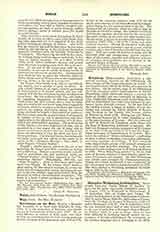

Hohenburg (ODILIENBERG; ALTITONA), a suppressed nunnery, situated on the Odilienberg, the most famous of the Vosges mountains in Alsace. It was founded about 690 by St. Odilia, who also was its first abbess. On the eastern slope of the Odilienberg she built a hospice, called Niedermunster or Nieder-Hohenburg, which afterwards became a convent for ladies of nobility and was destroyed by lightning in 1572. Originally Hohenburg seems to have been occupied by Benedictine nuns who were replaced by canonesses in the eleventh century. In the first half of the twelfth century it began to decline, but its discipline was restored by Abbess Relindis of Bergen near Neuburg on the Danube, who became Abbess of Hohenburg about 1140. During her rule Hohenburg became famous for its strict discipline as well as the great learning of its nuns. She was succeeded in 1167 by Herrad von Landsperg under whose rule the fame of Hohenburg continued to increase. She built the Premonstratensian monastery of St. Gorgon on the slope of the mountain in 1178, and the Augustinian monastery of Truttenhausen at its foot. Herrad is the author of “Hortus deliciarum”, a collection of short treatises on theology, astronomy, philosophy, and other branches of learning. It also contained some original Latin poems with musical accompaniment, and some beautiful drawings. The work was destroyed at the conflagration of the Strasburg library in 1870. When Hohenburg perished by fire in 1546 some of the nuns returned to their parents, others became Protestants and married. In 1661 Hohenburg was rebuilt and occupied by Premonstratensians. During the French Revolution it was confiscated by the Government and sold as national property in 1791. Msgr. Rass, Bishop of Strasburg, purchased the buildings in 1853 for his diocese.
MICHAEL OTT

